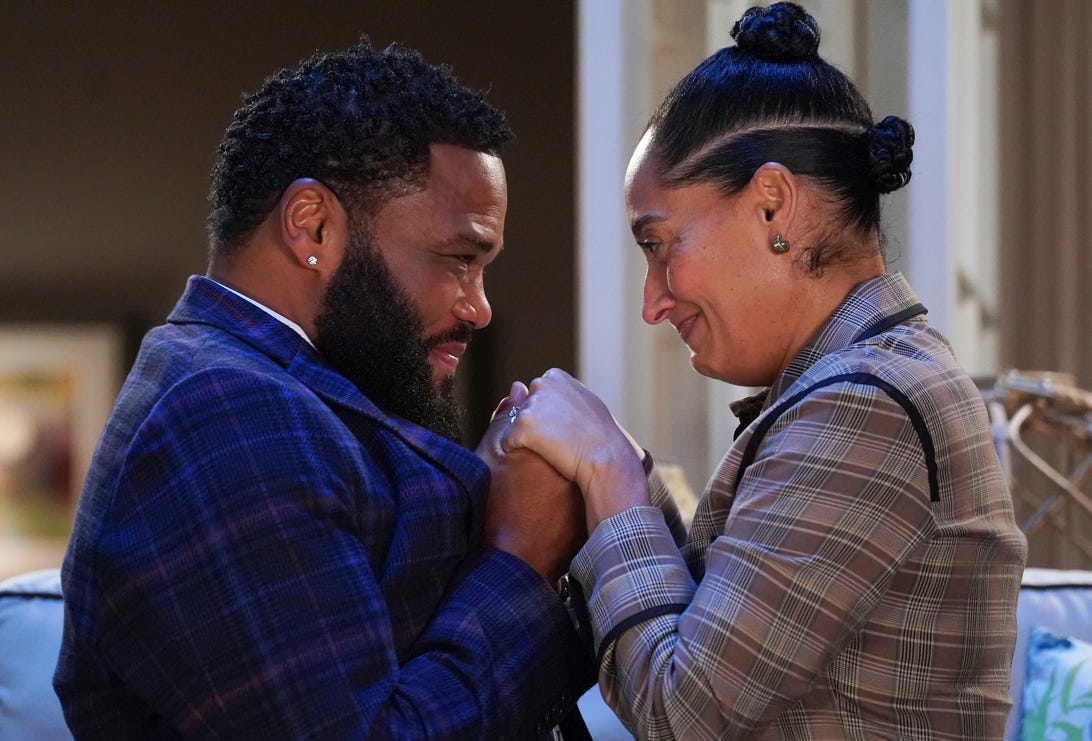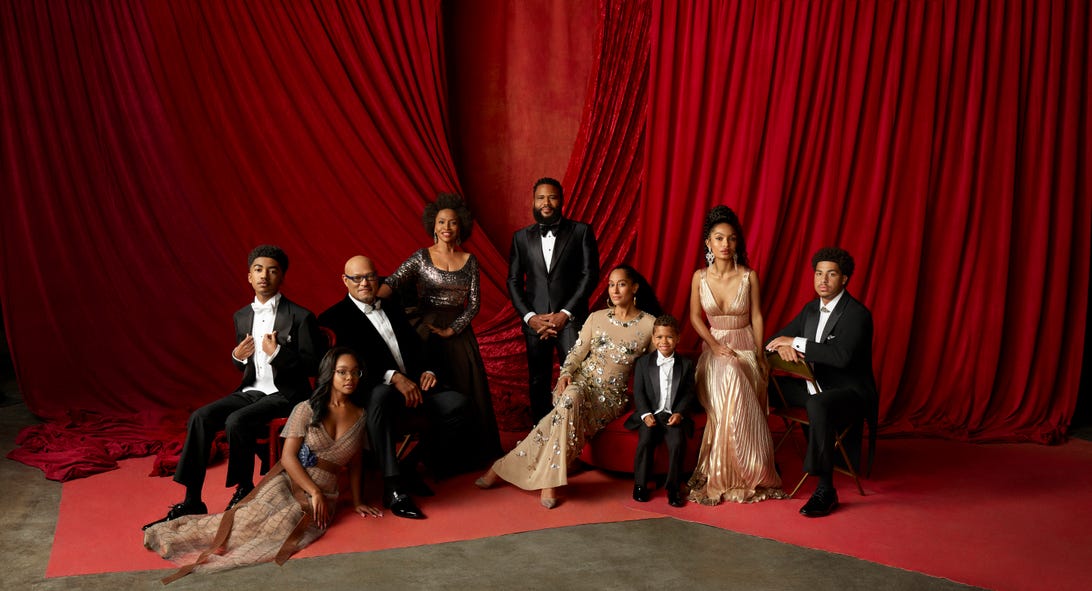After Eight Seasons, 'Black-ish' Signs Off With Meta Series Finale
Anthony Anderson and Tracee Ellis Ross in 'black-ish'
ABCWarning: This story contains spoilers for the series finale of black-ish. Read at your own risk!
Although "Homegoing," the title of the series finale episode of black-ish usually refers to a service held by Black Christians to send off a deceased person back to their lord, the ABC sitcom did not end its eight-year, critically-acclaimed, award-winning run so literally.
However, the Johnson family of black-ish still had to say a major good-bye within the show: to their beloved house, as Dre (Anthony Anderson) and Rainbow (Tracee Ellis Ross) decided to move from Sherman Oaks to a more culturally-diverse neighborhood within Los Angeles. It was a moment the writers and producers of the show had been building to for the 12 episodes of the final season prior to that final one, but the reasoning for why the central characters would make such a big life change now had its roots all the way back in the pilot.
"There were a lot of assumptions in the pilot: He has to live in this neighborhood because of his kids' schools. So, what if we took away some of those assumptions that we took for granted in the pilot?" showrunner Courtney Lilly tells Metacritic. "Latent in the DNA of the show was Dre's character was someone who, as a Black person from Compton who grew up without a lot of means [and is] now being able to provide almost anything to his kids — and also being one of the few people Black people in his environment — also feels like he has to represent for everybody. That drove a lot of the comedy, it drove a lot of the story, it drove a lot of the conversation, So for us, it was, 'Well, what if he didn't have to do that?'"
The first episode of the final season saw a guest appearance from former First Lady Michelle Obama, playing herself, a woman both Dre and Bow felt an instant connection, and inherently comfortable, with. From there, though the final season showcased a number of internal anxieties for the adult Johnsons as they dealt with concerns of cultural appropriation around sneaker culture and the fear of their youngest child (Devante, played by August and Berlin Gross) not keeping up in school. Additionally, there were enough changes with other members of the family — including Pops (Laurence Fishburne) and Ruby (Jenifer Lewis) planning to hit the road, and Junior (Marcus Scribner) ready to enroll in college — that (with a little inspiration from guest star Simone Biles) Dre and Bow could take a leap, too.
"It was all driving towards the last couple of episodes, where we knew that Dre as a character would have to examine the assumptions he had made for himself and say, 'Is there something different I could do?'" Lilly says.
The answer was a resounding yes. In addition to selling their house, Dre also decided to leave his cushy advertising gig, which led him to tell his wife he needed her "to carry the load for a while."
"In retrospect I would have loved to make more of a moment of it," Lilly says of that scene between the couple. "But him officially saying she's the head of household, that's part of his growth as someone who doesn't need to fight; he's a man saying, 'I'm OK with this.'"
As black-ish, which was created by Kenya Barris, grew after its September 2014 premiere, it had to contend with many behind-the-scenes moves. This included the change of leadership, including Barris leaving his own show mid-way through its run, and Lilly, who started as a co-executive producer, getting promoted into the showrunner role in 2019, as well as shifts with its cast. Yara Shahidi, who plays eldest Johnson child Zoey, was the first to get her own spin-off, grown-ish, which airs on Freeform. Other spin-offs, including Old-ish, centered on Pops and Ruby, and Brown-ish, about a Latinx family from executive producers Barris and Eva Longoria, were in development as black-ish was planning its final season.
But those additional pieces of what has become the ish universe (also including the two-season mixed-ish that aired on ABC from 2019 to 2021) only affected black-ish's end in very small ways, Barris and Lilly say. Yes, they had to get Pops and Ruby back together, and in getting Junior to a place where he was ready to attend college they realized they could move him into grown-ish next season. But what really determined how black-ish ended was the tone they wanted to capture as they signed off.
"A lot of it started with the pandemic, where we all took a step back and had to reevaluate how we spend our days. All of a sudden we're shut off from friends and family and going out — the creature comforts of life — and we go, 'OK well what am I doing with these 24 hours?' And with us being one of the first shows to go back into production, and there being so much uncertainty, it really reinforced how much making a television show is a second home," Lilly says. "So, when we were looking at the story and at writing the finale, the Johnson house was the place where the crew, the cast — all of us — spent our lives. And for me, breaking this story was a tribute to everybody who helped create that world."
That's why the very final moments of the finale break the fourth wall to welcome the extended cast and crew onto the Los Angeles street in front of the Johnson home, to dance down the street as music plays them out.
"The thing we used to do that I loved was our ending episodes would be fantasy," Barris tells Metacritic. "Just the idea of going back to those big, broad set-piecey things one in a while, that was something we felt like we were happy to do, and we had the cast that could do it. So, the big jazz number at the end was a callback to what we used to do."
"I didn't want to go out in a saccharin way; I wanted to go out happy. The fact that we got a chance to say goodbye in itself was amazing," he continues.
The cast of 'black-ish' in its final season
ABCOver the years, black-ish has picked up 25 Emmy nominations (including one win), four Screen Actors Guild Award nominations, three Critics Choice Award nominations, seven Golden Globe nominations (one win), an AFI Award, a Peabody, and 39 Image Awards (including six consecutive Outstanding Comedy Series trophies from the NAACP, which is a personal highlight for Barris). The series also became beloved by critics, earning a 77 Metascore.
However, the show wasn't guaranteed such success from the start. Barris recalls early controversy around the title of the show, which opposers called "socially damaging and offensive" and started a Change.org petition urging the show's network, ABC, to consider pulling the plug on it. Although Barris says the studio and network executives were "supportive" of black-ish from the start, he admits feeling like they had a different idea about what the show would be, which led him to wonder when (not if) that plug would get pulled.
"I remember early on there was an episode about spanking, and they made us move that episode because there was a football player named Adrian Peterson who spanked his kid and got charges and that created like this big thing in the world. We asked most of the people in the studio and the network, 'How many of you guys were spanked?' And most of them had been spanked. And we were like, 'Why can't we talk about that?'" Barris says.
"It was something they were almost unwilling to engage in conversation, and I started wondering then what was going to happen because those were the kinds of stories we wanted to tell," he continues. "And it changed the trajectory of the show because what we found when we did it was, you find your tribe, even if you're in a situation where you don't really see the tribe out front. It spoke very heavily to the Black community and to the white community."
Mixing everyday family stories, often pulled from the writers' own lives and conversations with their loved ones, with topics (yes, political ones) playing out in news headlines became what black-ish was known for. Rather than look at what was going on in the news and saying, "How can we write about this?," though, the writers and producers came at their story ideas from the family-first angle. This was true for everything from "The Word" (in which Jack, played by Miles Brown, is suspended for saying the n-word at school); to "Juneteenth," which sees the Johnson family getting musical to showcase why June 19 should be celebrated; and "Please, Baby, Please," a long-shelved episode digging into Dre's fears about Donald Trump as president. It was true of the final season episodes, as well.
"My philosophy was, 'Go hard.' Let's go out swinging," Barris says. "I tell young writers all the time, you get notes from the studio, notes from the network, but there has never in the history of film arts been a pilot or movie or anything that the Powers That Be have said, 'I don't like this script, but they took all our notes, so we're going to make it.' So, you have to know that whatever notes they give you, be open to them, but at the end of it, you have to be true to your voice."
For Lilly, leading the final season meant making sure they were "celebrating the joy that the family experiences with each other." And at times that also meant looking back to pay homage, or more explicitly reflect, on some of those moments, which led to including a pivotal montage for twins Jack and Diane (Brown and Marsai Martin), who literally grew up on screen.
"So much of it is meta," Lilly admits. "You look at shows like Game of Thrones, you look at a show like Breaking Bad, these are shows where you're moving to a terminal point that people have been expecting. Like, Tony Soprano, is he gonna live or die? We knew we never had that, and that was actually freeing. The last episode was an opportunity for us to to honor what we all gone through, and hopefully, find something the audience could feel the same way in."
Where to watch black-ish:

